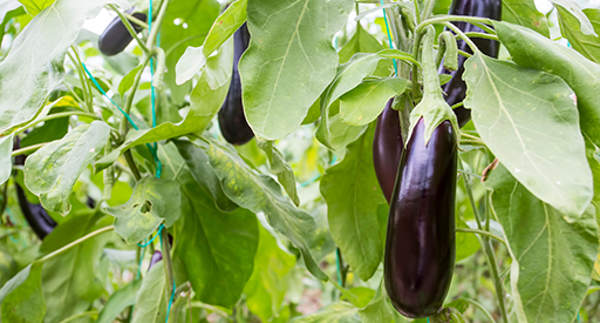
5 Steps to Eggplant Planting Success
- Choose a sunny, sheltered spot in your garden.
- Prepare your soil with organic matter like compost and sheep pellets.
- Add a layer of vegetable mix to plant into. Eggplants need a long, hot summer to produce and are best grown from spring after frosts.
- Feed every four weeks with vegetable food.
- Add a layer of mulch and keep your eggplants well watered.
Follow our full guide below to a bumper crop of eggplants.
Eggplants are a Mediterranean favourite, widely used in all sorts of cuisine, these wonderful vegetables are mostly enjoyed roasted, grilled or pickled. They don’t require a lot of special care and come in a lovely range of colours. From the traditional dark purple types through to creamy-white, yellow, lavender, pink and green varieties.
Prepare
Eggplants, or aubergines, as they are sometimes called, need a long, hot summer to produce a decent crop. Eggplants are happy growing outside the garden once the weather is warm. They are frost-tender, so in cold areas don’t even think about planting them until November. They take around three months to mature.
Refer to our Planting Calendar for when to plant eggplant in your region.
Plant
The better the soil, the better your plants will grow. Eggplants like a rich, fertile soil. If you are starting with an existing garden bed dig in organic matter like Tui Sheep Pellets and Tui Compost to your soil. Then you can add a layer of Tui Vegetable Mix. If planting in containers, fill with Tui Vegetable Mix.
The best times to plant are early in the morning or late in the day, so the plants aren’t exposed to the hot sun straight away. Always water plants well before and after planting.
Staking may be required for taller plants and if the amount of fruit is causing them to struggle to hold themselves up.
Planting in garden beds
Bushy types are best planted 50cm apart, but smaller varieties can be planted closer together.
- Water plants thoroughly before planting and allow to drain.
- Dig a hole, approximately twice the depth and width of the root ball of your plant.
- Partly fill the hole with Tui Vegetable Mix.
- Gently loosen the root ball of your plant and position the plant in the centre of the hole.
- Fill in with Tui Vegetable Mix.
- Press soil gently around the base of the plant.
- Water your plant well.
Planting in pots and containers
- Water plants thoroughly before potting and allow to drain.
- Partly fill your container with Tui Vegetable Mix.
- Gently loosen the root ball of your plant and position the plant in the container.
- Fill your container with Tui Vegetable Mix up to 3cm from the top.
- Tap the container gently on the ground to settle the mix.
- Press soil gently around the base of the plant.
- Water your plant well.
Protect your plants from the elements with layers of Tui Pea Straw Mulch, to help keep their roots moist and keep your garden weed free.
Nourish
Feed your plants and they will feed you. Eggplants use nutrients from the soil as they grow, so replenishing the nutrients ensures your plants grow to their full potential.
Select a fertiliser specially blended for your crop like Tui Vegetable Food. Feed eggplant planted in pots and containers with Tui NovaTec Premium fertiliser.
For supercharged feeding with quick visible results try Tui Vege & Herb Liquid Superfood - perfect for pots & containers too!
Well watered, well nourished eggplants will have a better chance of keeping insect pests and diseases at bay.
While your eggplants are growing regularly apply a dose of Tui Organic Seaweed Plant Tonic between fertiliser feeds to give them a welcome boost.
Harvesting
Harvest your eggplants when the skin is shiny and the fruit is fully coloured. They will start to taste bitter when the skin colour turns dull.
Be vigilant and stop unwanted insects and diseases from ruining your plants. Slugs and snails can be an issue - lay Tui Quash slug and snail control around young plants.